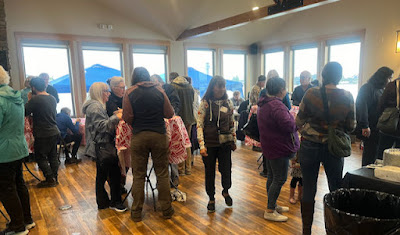So, does that mean a break from thinking? Or a break so I can think? More the latter, but it's the thoughts invading my brain more than my deliberately saying, "Whoa, I need to stop and think a while."
So this post is just a brief (yeah, that's always my intent) overview of the action taking place in my brain, in hopes of not forgetting the many loose ends. [And it didn't stay brief so I'm adding an overview so you don't get lost in the meanderings.]
- OLÉ classes - Project Innocence and the Fairbanks Four and a proposal for police to have Devil's Advocates keeping them from straying after the wrong suspects
- OLÉ classes - Homelessness
- The Struggle for Modern Tibet
- Dan Sullivan and the tension between loyalty and the rule of law and Profiles In Courage
I've bolded these highlights and enlarged them so you can scan on down to the ones you're most interested in. Or just quit right here.
Thursday I went two OLÉ classes: The Innocence Project and the Pebble Mine class.
Friday was State and Federal Courts in the morning and Homelessness in the afternoon.
I'm also reading ahead for my December book club meeting -
The Struggle for Modern Tibet, by Goldstein, Stebeschuh, and Tsering. It's Tsering's story and the other two helped him getting written down in English. He's a Tibetan, from a peasant family, who gets to Indian and works with the Dalai Lama's older brother and then manages to get a scholarship to the US. He feels the Tibetans in India who follow the Dalai Lama are basically supporting the old Tibetan class system and he feels appreciation for the Chinese who are interrupting that and bringing roads and schools and hospitals to Tibet. He wants to help with bringing Tibetan culture into the modern world (he was partly influenced by reading medieval Western history in the US and thinking they had the same kind of religiously dominated class system then too, but were able to modernize yet keep their distinct cultures. Everyone thinks he's crazy to go back, but he does and gets sent by the Chinese to a that is training Tibetans to be teachers and to go back to Tibet. It's the beginning of the Cultural Revolution and gets to go on a field trip to march before Mao at Tiananmen Square. That's as far as I've gotten. I'm still waiting to see how it ends up. (Well, I know he got back to the US somehow and with the two co-authors to write the book.)
Tibet was one of about three or four topics that my Chinese students were united and unbudging on: China saved the Tibetans from a slave culture run by the Dalai Lama and the ruling class. And Tshering gives support for this interpretation. So I'm challenging my own Western take on Tibet by even reading this book.
So what else am I thinking?
The Innocence Project - Thursday was the last class. The executive director and until recently the only employee, Bill Oberly, is the main speaker, sometimes backed up by Board president, Mark Johnson. Thursday, Bill finished up the reasons people are wrongly convicted and then chronicled the Fairbanks Four trials, the one case the the Alaska Innocence Project has overturned and gotten the wrongly convicted freed.
As he told the saga, he illustrated the reasons for wrongful convictions he'd just finished. The problems included:
- false confessions
- false eye-witness testimony,
- misuse of forensic pattern identification (in this case using bootprints to 'prove' a suspect's boot was involved) (I did a blog post on this topic a week or so ago)
- false informant testimony
- police misconduct (intentional and unintentional)
In fact, all of the problems as Oberly tells it (and I don't doubt him, but he's my only source) seemed to stem from police misconduct - from how they got the confessions, how they pressured a witness to tell their story even though it was different from the witnesses original and then later story, and the coached testimony of a prison inmate who said one of the Fairbanks Four had confessed to him in prison.
This issue is one that's been rummaging through my brain and has come up with the idea that police (and probably many other types of government, and for that matter private companies) need to have some form of
Devil's Advocate involved in murder and other felony investigations. The Devil's Advocate would be there to challenge the lead investigators when they seem to be caught up in confirmation bias (seeing the facts that confirm their suspicions, and not seeing ones that challenge their theory of the case). The Devil's Advocate's job would be to put pressure on the investigators when their not following proper procedures for interrogating suspects (no lawyers, no parents even for minors, planting false scenarios (in this case on pretty intoxicated suspects who couldn't remember anything from the previous couple of hours), etc.
We have people who do this sort of work after the fact - Ombuds offices, Inspectors General, etc. But if this work had been done on the front end, innocent people wouldn't end up spending five, ten, fifteen, and more years in prison. And the actual murderers wouldn't still be loose killing other people. And overzealous cops and prosecutors would be checked early, and perhaps disciplined or terminated before doing more damage.
Would this cost more? Cost isn't supposed to be a factor in getting to justice. But trying innocents suspects costs way more than the cost of a position of Devil's Advocate. And if the victims are able to sue and win a wrongful conviction case, well, there's money that would have funded a dozen Devil's Advocates.
I've not given details of this case yet and won't today. So it's hard for readers to feel the injustices done in this case. But I've recommended several times already that readers here watch the Netflix short series
When They See Us about the Central Park Five. All the reasons for wrongful convictions are clearly illustrated in that case. It's heartbreaking, but compelling viewing. And all five have been exonerated and released.
Tied to all this is a notion of written about professionally on corruption. There's a natural tension in all of us between following our human social
value of loyalty and the value of following the rule of law. We all have genetically built into us a loyalty to our 'group' whether that be family, team, school, profession, work group, whatever. And that notion of loyalty is reinforced by our society and every other society.
Studies show that loyalty is a more important value for political conservatives in the US than for liberals. We can see that playing out in Washington now as the Republicans are being held tightly in control by the president, despite their private misgivings. It's the power that mafia bosses and platoon leaders and sports coaches have. They are far less likely to vote, as the Democrats did with Senator Al Franken, to give up one of their own because of a violation of principles.
The idea of rule of law is, in part, to counter blind loyalty so that people are treated fairly and equally. While loyalty can work in concert with the rule of law, it can also thwart the rule of law. In police and military and corrections organizations unwritten "
Codes of Silence" or "
The Blue Wall" will keep police and corrections officers from reporting crimes within their ranks.
This loyalty vs rule of law tension also got me to thinking about one of my Senators -
Dan Sullivan. While he has said he did not vote for Trump, he's since been caught up in the loyalty to the Republican Bully in Chief (sorry conservatives,
that characterization is pretty accurate - just look up any literature on bullying and the spell they hold on those around them). He even signed Sen. Graham's letter condemning the House impeachment investigation. (My other Republican Senator did not.)
So I've been wrestling with how to reach out to him - not to attack him, but to find ways to open his brain to alternative ways of seeing all this. He's a Marine (still in the reserves) and their values are all for courage. But they are also indoctrinated into a loyalty to the Marines that means not following orders to run into danger takes less courage than not. So while he might have tremendous physical courage and be willing to risk his life on the battlefield, the moral courage to break with his loyalty to the president and the Republican Party is much more difficult.
So how can someone talk to him about that? I've started looking at John Kennedy's book
Profiles in Courage (it's available at the link online
.)
Kennedy wrote about six US Senators who stood out by overcoming all the pressures weighing dow US Senators. Maybe that would help, but I doubt it.
I'm also pondering all the data we've gotten on
homelessness. The Municipality of Anchorage is participating in a data gathering and management plan based on a nation wide data system,
Built For Zero. It tracks monthly:
- newly homeless (and where they come from in terms of previous housing)
- current homeless
- exiting homelessness
The intent is to always have enough beds so that zero people spend the night homeless. It involves collecting and sharing data on all the homeless, why they're homeless, what level of services they need, etc. so that they can find the right level of help for people in different categories of need. And always making sure there are enough beds. The plan they have addresses
most of the questions the class raised the first week. Here are some links - though they don't quite deal with some of the programs and data we've seen in class:
That's just a smattering of the activity going on in my skull. When things get so busy, it's hard to sit and write something that doesn't meander a bit.
 The Galata Tower is a major landmark in Istanbul. This first picture is from the Istanbul Modern (the modern art museum.). The tower is the one on the left. The other one is a minaret from a mosque.
The Galata Tower is a major landmark in Istanbul. This first picture is from the Istanbul Modern (the modern art museum.). The tower is the one on the left. The other one is a minaret from a mosque. 


























